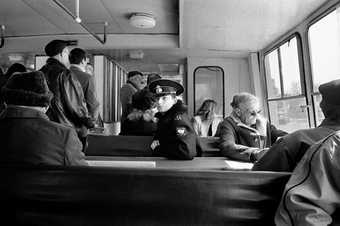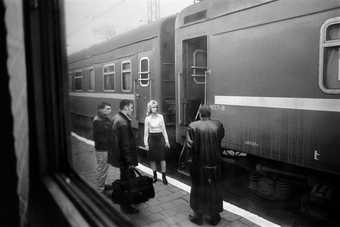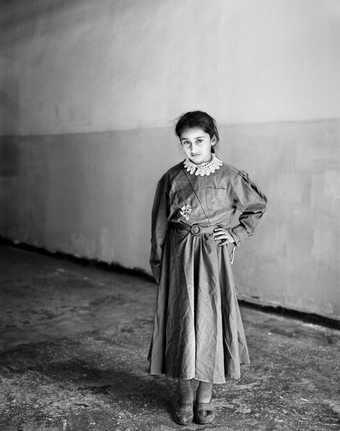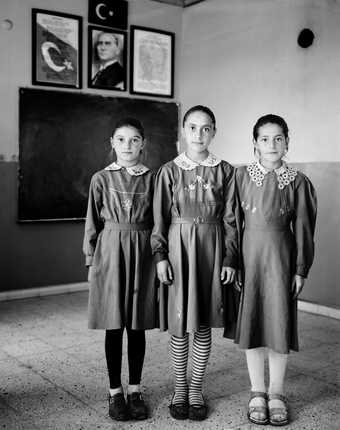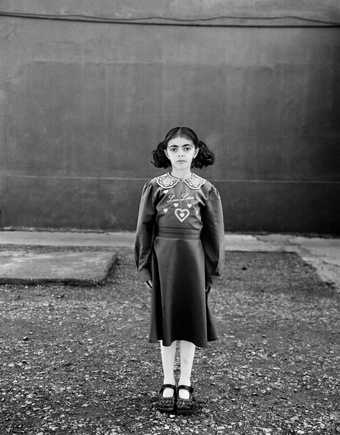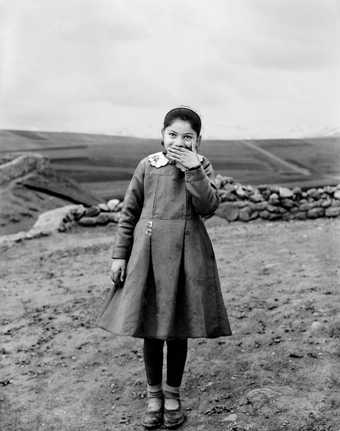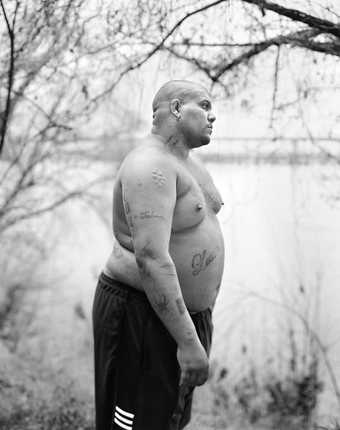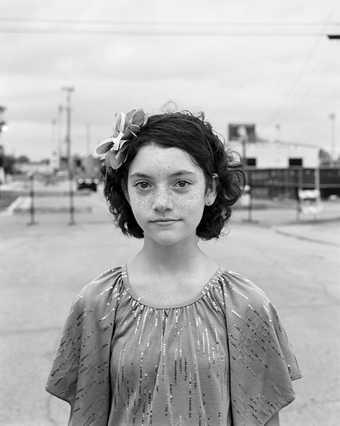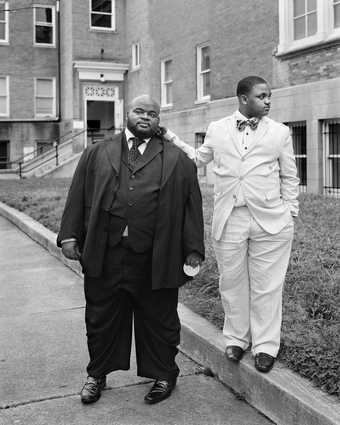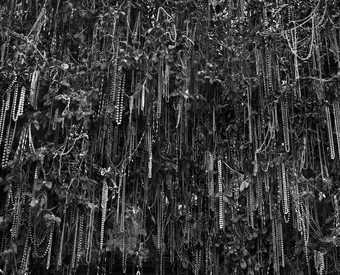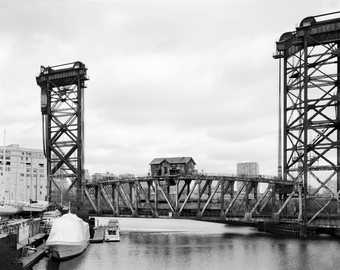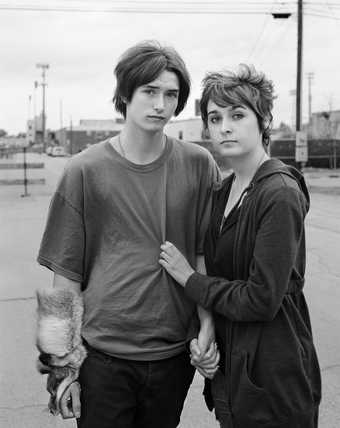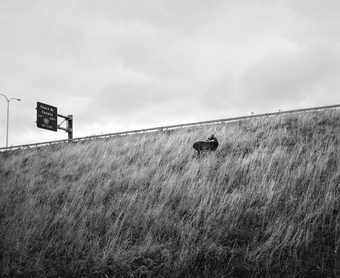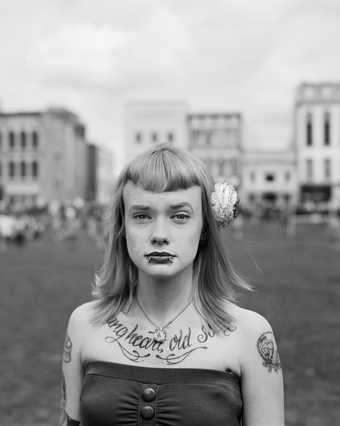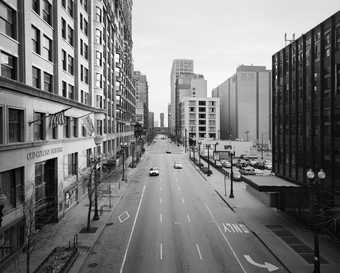
In Tate St Ives
- Artist
- Vanessa Winship born 1960
- Medium
- Photograph, inkjet print on paper
- Dimensions
- Image: 780 × 980 mm
- Collection
- Tate
- Acquisition
- Purchased with funds provided by the Photography Acquisitions Committee 2019
- Reference
- P82445
Summary
This black and white photograph is one of several works in Tate’s collection by the British photographer Vanessa Winship. It comes from a series entitled she dances on Jackson 2011–12 (Tate P82445–P82458). The series exists in an edition of twelve Fine Art pigment prints and Tate’s prints are various numbers from the main edition. The photographs were taken in the United States after Winship had won the Prix Henri Cartier-Bresson in 2011; she spent over a year travelling across America, from California to Virginia, New Mexico to Montana. She went with the intention of exploring a country in the throes of economic decline and to assess the impact of that decline on the fabled American dream. The sudden death of Winship’s father immediately prior to the making of the work further inflected its changeable mood of sorrow and hope. She wrote in the book that accompanied her exhibition at the Barbican Art Gallery, London in 2018, And Time Folds, that ‘Like the small, barely audible ripple on the pond, this work [she dances on Jackson] is my note of that time.’ (Winship 2018, p.69.)
In the series she encapsulates a sense of the vast emptiness of America’s landscapes both built and natural. The land is sparse and depopulated, with the exception of occasional, startled wildlife; its cities are places from which everyone seems to have departed. Embued with a feeling of melancholy and isolation, Winship’s landscapes are then interwoven with a sequence of close-up portraits. Alone on the road for many months, her portraits pay homage to the unavoidability of human connection. Reliant on the openness of the strangers she met on this long journey, she was alert to the signs of intimacy and trust between people. In Father and son, Richmond, Virginia (Tate P82451) an angelic young boy dressed in a white suit reaches calmly towards his father and clasps his left ear, gazing out of the frame as his suited parent stares evenly into the depths of the lens. In Young couple, Jenks, Oklahoma (Tate P82454) a young woman holds tight to the left hand of her boyfriend and even tighter to the front of his t-shirt, as they present their love to Winship’s camera.
Prior to this, Winship had worked in the Balkans and around the Black Sea and eastern Turkey (see Imagined States and Desires: A Balkan Journey 1999–2002, Tate P82415–P82420, Black Sea: Between Chronicle and Fiction 2002–6, Tate P82421–P82436, and Sweet Nothings: Schoolgirls of Eastern Anatolia 2008, Tate P82437–P82444). Using black and white photography, she approached her subjects not as a photojournalist – a recorder of specific events – but as an artist working with a poetic sensibility and applying an oblique gaze to geopolitical realities. Her experience in these regions led her to focus on the impact of history not just on the terrain but on human identity, becoming fascinated with the mark that history makes on people. She also realised that black and white photography, as an abstraction from real life, suited her purpose better than colour, because it encourages the viewer to move between real time and memory. Speaking in 2018, she explained: ‘This is the paradox of photography – it captures the now, which is immediately then of the past.’ (Quoted in Marigold Warner, ‘Time Folds for Vanessa Winship at Barbican Art Gallery’, British Journal of Photography, online, 12 June 2018, https://www.bjp-online.com/2018/06/winship-time-folds/, accessed 24 August 2018.)
She has characterised her work as focusing ‘on the junction between chronicle and fiction, exploring ideas around concepts of borders, land, memory, desire, identity and history. I am interested in the telling of history, and in notions around periphery and edge. For me photography is a process of literacy, a journey of understanding.’ (Quoted in Georgia, Schoolchildren, 2011, https://www.agencevu.com/stories/index.php?id=1228&p=148, accessed 11 August 2018.)
Further reading
Vanessa Winship, Sweet Nothings, exhibition catalogue, Foto8, London 2008.
Vanessa Winship, exhibition catalogue, Fundación Mapfre, Madrid 2014.
Vanessa Winship, Vanessa Winship: And Time Folds, London 2018.
Kate Bush
August 2018
Does this text contain inaccurate information or language that you feel we should improve or change? We would like to hear from you.
You might like
-
Vanessa Winship Sevastopol, Ukraine
2002–6 -
Vanessa Winship Simferopol, Ukraine
2002–6 -
Vanessa Winship Untitled. Hakkari - Iraq Border
2007 -
Vanessa Winship Untitled. Esenkent - Armenian Border
2007 -
Vanessa Winship Untitled. Dogubeyezit - Iran/Azerbaijan Border
2007 -
Vanessa Winship Untitled. Kars - Armenian Border
2007 -
Vanessa Winship Man by the river, Richmond, Virginia
2011–12 -
Vanessa Winship Young girl, Jenks, Oklahoma
2011–12 -
Vanessa Winship Father and son, Richmond, Virginia
2011–12 -
Vanessa Winship Beads, Lafayette, Louisiana
2011–12 -
Vanessa Winship Bridge on Canal Street, Chicago, USA
2011–12 -
Vanessa Winship Young couple, Jenks, Oklahoma
2011–12 -
Vanessa Winship Deer on highway embankment, Buffalo, NY
2011–12 -
Vanessa Winship Young heart, old soul, Lexington, Kentucky
2011–12 -
Vanessa Winship Old Colony Building, Chicago
2011–12

